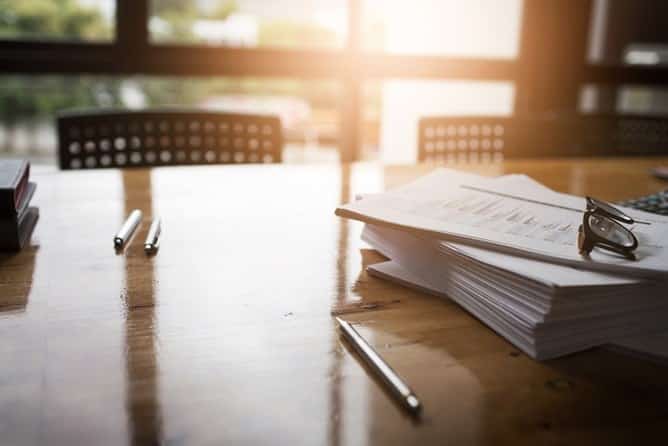When you’re hurt in a personal injury accident, the Nevada Rules of Evidence are essential to know. At a hearing or trial, the court must follow the rules when it decides what evidence to allow and how to allow it. The Rules of Evidence control what evidence the court can receive and how it can accept the evidence.
Knowing how to use the rules of evidence is a critical part of building and presenting an effective injury claim. Your personal injury lawyer in Las Vegas can help you understand these rules and how they may apply to your specific circumstances. Here’s what you need to know about the Nevada Rules of Evidence in your accident case.
START YOUR FREE CONSULTATION
NO FEES UNLESS WE WIN!
What’s Relevant Evidence in a Nevada Personal Injury Case?
The Nevada Rules of Evidence are found in Nevada Revised Statute Chapter 48. The most basic rule of evidence in Nevada is that relevant evidence is admissible. Evidence is relevant if it makes an issue in the case more or less likely to be true. For example, in an accident, whether there was water on the floor where you slipped is a relevant question. Your religious preference is not a relevant question.
Nevada’s rule about relevant evidence is Nevada Revised Statute 48.015. Your Las Vegas accident attorney can help you fight against defense tactics that are designed to harass you and prejudice the jury. There are a few limits to the admissibility of relevant evidence. Under Nevada Revised Statute 48.035, the court can refuse to allow relevant evidence if they believe the evidence is too prejudicial to either party or if they think it could confuse or mislead the jury.
Admitting a Piece of Evidence in Court
Some of the evidence in a trial is physical evidence like photographs and paperwork. To admit a picture or a document, you must follow Nevada Revised Statutes Chapter 52 which covers documents and other physical evidence. To admit documentary evidence in court, you must testify that the evidence is what you say it is. For example, for a photograph, you need the testimony of a witness who says that the photograph shows the accident scene. Nevada Revised Statute 52.015 gives the rules for how to authenticate a picture or document to admit it in court.

Some records are self-authenticating. Self-authenticating means that there’s no other evidence required to put the document in the record at the hearing or trial. Examples of self-authenticating documents are public records that are certified. Nevada Revised Statutes 52.115 and 52.125 give the rules for self-authenticating records. It’s important to work with your Las Vegas injury attorney to take the right steps to admit documents and photographs at trial.
What’s Hearsay in a Nevada Accident Case?
No discussion of evidence is complete without talking about hearsay. Rules for hearsay evidence may seem confusing, but they’re important to getting a fair trial in your case. Hearsay is something someone says out of court that’s offered to prove the truth of the statement. If a statement is offered for a reason besides proving the truth of the statement, it’s not hearsay.
For example, “When I was waiting for the police officer after the accident, I heard the man say that it was raining,” is a hearsay statement if you’re using the statement to prove that it was raining at the time. To admit the evidence, you need to call the witness to testify at the trial and ask them if it was raining. On the other hand, if you’re hoping to admit the statement to show that the witness was conscious and able to speak, the statement is not hearsay.
Generally, hearsay testimony isn’t admissible at trial. But there are many exceptions when hearsay statements are allowed. Exceptions to the general hearsay rule include:
- A present sense impression – a statement that someone makes while they’re experiencing an event, like an accident
- An excited utterance – something someone says while they’re still emotional or excited about an event, like right after an accident
- Statements for the purpose of receiving medical treatment
- Records of regularly conducted activity- in an accident case like a slip and fall, records might show the cleaning schedule of a store, regular maintenance or the use of security guards
- Something a person says when they believe they’re about to die
- A statement that’s against a person’s own best interests, like a statement that admits guilt or responsibility
Nevada Revised Statutes Chapter 51 gives the rules for hearsay.
Offers of Compromise
The Nevada Rules of Evidence prohibit parties from admitting evidence of settlement offers. If you extend a settlement offer to the other side and they refuse, neither one of you can present evidence to the court about the proposal.
The same goes if the other side extends a settlement offer that you refuse. The purpose of Nevada Revised Statute 48.105 is to encourage the parties to negotiate in good faith knowing that it can’t be held against them in court if they don’t reach an agreement.
Discovery Includes Evidence That May Be Inadmissible
Even though there are rules of evidence that limit how information is received in a trial, you can still build your case by investigating all of the information that may be relevant to the case. Of course, discovery can include admissible evidence, but it can also include facts or information that’s not admissible as long as it may lead to relevant information.
It’s important not to avoid gathering information, records or witness testimony just because the information itself may not be admissible under the Nevada Rules of Evidence. You can collect all of the information that might be important and then decide what’s admissible and what to admit at your trial.
Using the Rules of Evidence Effectively in Your Accident Case
If you’re in an accident, understanding the rules of evidence is key to building a strong case. Our Las Vegas accident attorneys can help you strategize to build your case using the rules of evidence to your advantage. Contact us today to speak about your case with a member of our legal team.
Adam S. Kutner reviews and testimonials
“I needed an attorney because I couldn’t deal with the accident on my own, so I needed someone else’s opinion about my accident.
Well I heard about Adam Kutner through an associate of mine and I chose to seek him because I heard of him before also, so I thought he would be the best option for me.
I was very happy with my settlement and it came quicker than I thought, in just a couple months I received a check in the mail.
When I recommend Adam Kutner I would tell them that the settlement comes very quickly, and he is very helpful with transportation and whatever else you may need.”
– Deborah Banks. 5/5 Stars
START YOUR FREE CONSULTATION
NO FEES UNLESS WE WIN!
SE HABLA ESPAÑOL
Call Now! Free Consultation!

Adam S. Kutner
PERSONAL INJURY LAWYER
With more than 33 years of experience fighting for victims of personal injury in the Las Vegas Valley, attorney Adam S. Kutner knows his way around the Nevada court system and how to get clients their settlement promptly and trouble-free.












